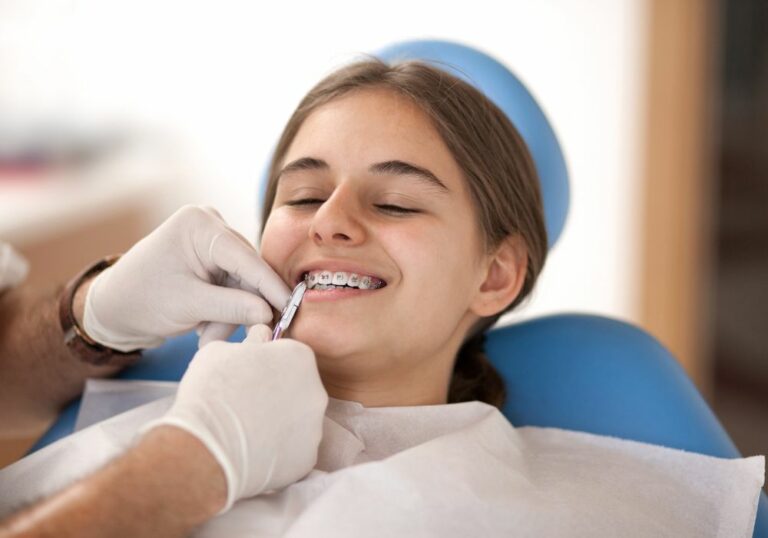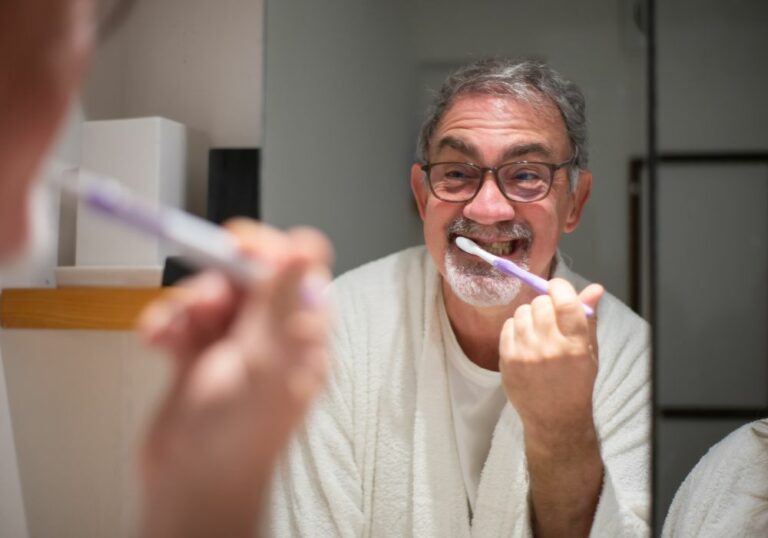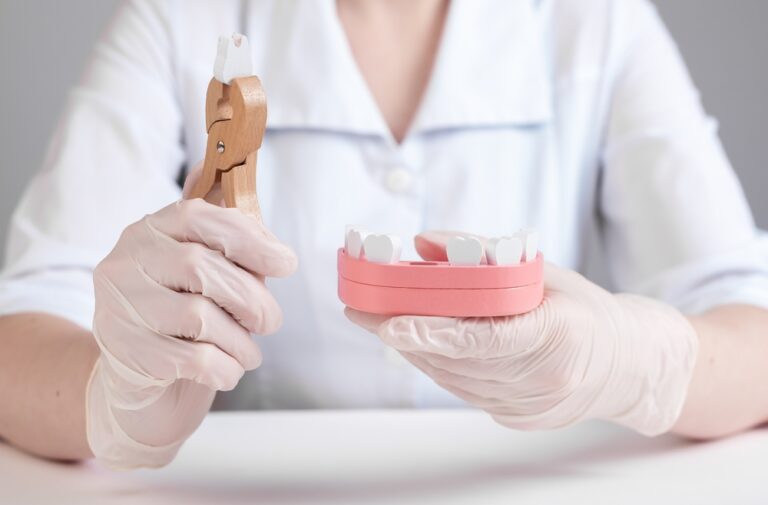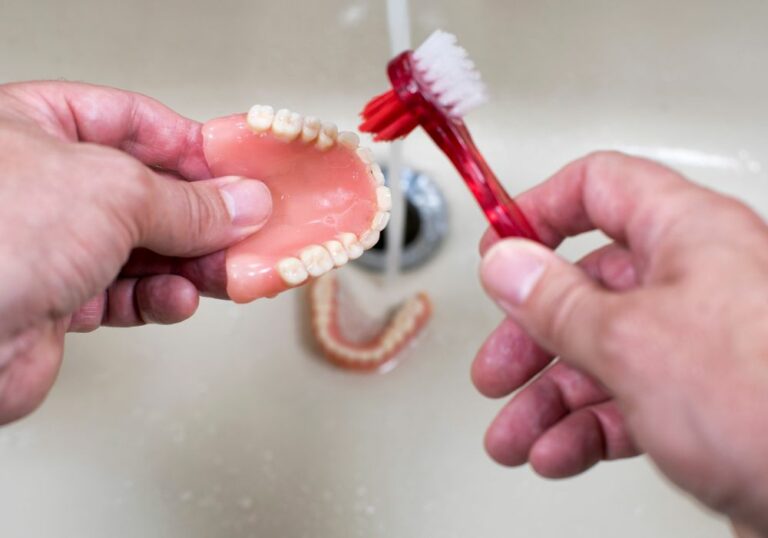Having bright, white teeth is important for many people and there are a variety of methods available for whitening teeth, from over-the-counter products to professional in-office treatments. Some people opt to use household ingredients like baking soda, lemon juice, or hydrogen peroxide to whiten their teeth instead of commercial products. Hydrogen peroxide is commonly used as an active ingredient in many teeth whitening treatments, so it’s understandable why some wonder if hydrogen peroxide alone will be effective for whitening their teeth at home. This comprehensive article dives into the details on whether hydrogen peroxide is safe and effective for DIY teeth whitening.
What Is Hydrogen Peroxide and How Does It Whiten Teeth?
Hydrogen peroxide is a chemical compound made up of two hydrogen atoms and two oxygen atoms (H2O2). It is a clear, slightly viscous liquid that appears colorless in its pure form. Hydrogen peroxide has strong oxidizing and bleaching properties due to the extra oxygen atom it contains compared to water (H2O).
Hydrogen peroxide works to whiten teeth by:
- Penetrating through the hard, outer enamel layer of the teeth and reaching the dentin layer underneath. The dentin is softer and more porous.
- Oxidizing and breaking down pigments, organic compounds, and residue on and within the teeth that cause stains and discoloration. Common staining culprits include food and drinks like coffee, tea, red wine, berries, tomato sauce, and curries. Smoking cigarettes and chewing tobacco also leads to considerable staining.
- Releasing oxygen bubbles during the oxidization process, which lifts stains from the microscopic pores and surfaces of the enamel.
- Returning teeth to a brighter, whiter shade as stains are removed and the natural whiteness of the enamel and dentin is revealed. Hydrogen peroxide is not itself a whitening agent, but rather removes discoloration.
Professional dental whitening treatments done in a dentist’s office often contain very high concentrations of hydrogen peroxide, usually between 15-35% concentration. Over-the-counter whitening strips, gels, and toothpastes contain much lower concentrations of hydrogen peroxide, typically ranging from 3-10% concentration.
While hydrogen peroxide works very effectively to oxidize and remove staining, higher concentrations increase the risk of tooth and gum sensitivity or more serious side effects. Therefore, cautious and moderate use is recommended for home whitening.
Is Hydrogen Peroxide Safe for Whitening Teeth at Home?
Using dilute solutions of hydrogen peroxide for occasional home teeth whitening is generally considered safe when done carefully and correctly. However, hydrogen peroxide can cause issues like sensitivity or gum irritation if improperly used. Follow these tips for safe DIY whitening with hydrogen peroxide:
- Dilute it – Only use hydrogen peroxide solutions of 3% concentration or less. This is the common household grade hydrogen peroxide found in most drugstores. Using higher concentrations without professional supervision runs the risk of severe tooth and gum damage.
- Limit frequency – No more than 1-2 times per week is recommended for home whitening sessions. Frequent overuse of hydrogen peroxide can lead to significant gum irritation, tooth sensitivity, and possible long-term enamel issues.
- Rinse thoroughly – Always rinse your mouth very thoroughly with plain water after completing hydrogen peroxide whitening treatment. Swish and gargle to remove any remaining peroxide, as extended contact can damage gums.
- Watch for sensitivity – If you experience concerning sensitivity, pain, or irritation during or after whitening with hydrogen peroxide, stop immediately. This may be a sign you need to discontinue use or try a lower concentration.
- Discuss with your dentist – Talk to your dentist before beginning any hydrogen peroxide whitening regimen to rule out any oral health problems that may make whitening ill-advised. Be sure to inform them of any sensitivities you experience.
Hydrogen peroxide is not recommended for children under 18 years old or for people with certain oral health conditions:
- Gum disease
- Cavities
- Worn enamel
- Exposed dentin
- Leaky fillings
- Other active dental issues
Those with the above conditions should have their oral health stabilized first before attempting any peroxide whitening treatments. Always consult your dentist if you have any concerns.
Effective Methods of Whitening Teeth with Hydrogen Peroxide
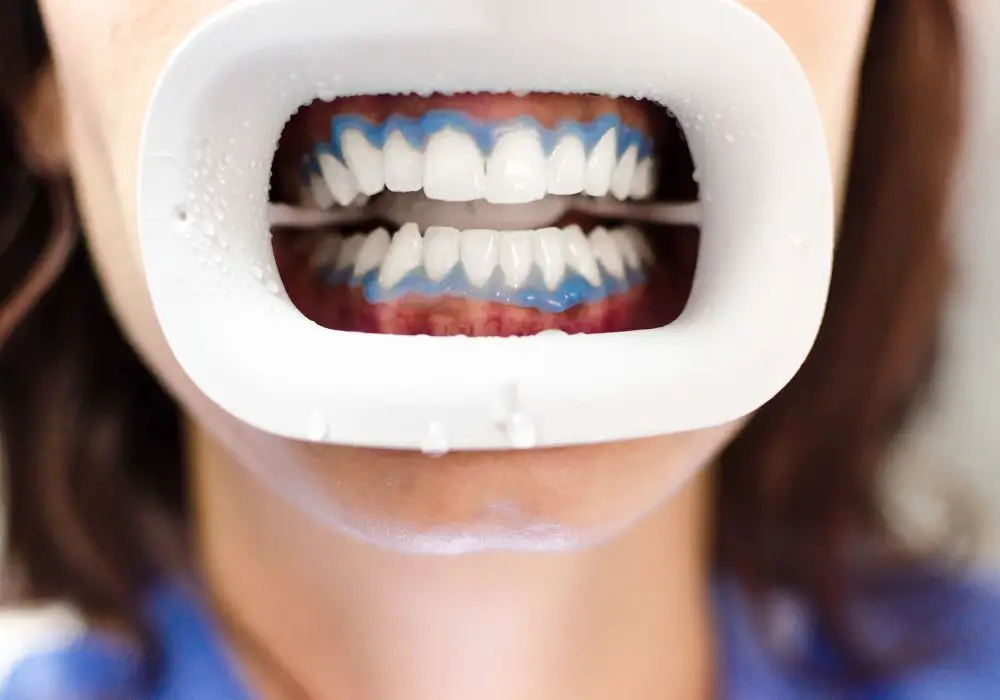
When used correctly, here are some safe and helpful methods for whitening your teeth at home with hydrogen peroxide:
Hydrogen Peroxide Rinse
- Mix 1 tablespoon of 3% household hydrogen peroxide with 1/4 cup of water. This dilutes it to a gentler concentration for home use.
- Swish the hydrogen peroxide solution around your mouth for 30-60 seconds, taking care to cover all tooth surfaces. Focus on targeting stained areas.
- Spit out the peroxide rinse into the sink once done swishing – do not swallow the rinse.
- Rinse your mouth thoroughly with plain water to remove any remaining peroxide.
- Use this hydrogen peroxide rinse method just 1-2 times per week for gradual whitening over time.
Hydrogen Peroxide & Baking Soda Toothpaste
- Make a homemade whitening toothpaste by mixing equal parts hydrogen peroxide (3% concentration) and baking soda.
- Brush teeth thoroughly with this mixture for 2-3 minutes, covering fronts, backs, and chewing surfaces.
- The baking soda provides a gentle abrasive effect to help scrub away superficial stains, while the peroxide oxidizes and lifts deeper discoloration.
- Rinse mouth well after brushing to remove all remnants of the toothpaste.
- Use this hydrogen peroxide toothpaste no more than 1-2 times per week. The baking soda can damage enamel with overuse.
Hydrogen Peroxide Whitening Gel
- Purchase over-the-counter hydrogen peroxide gels designed specifically for at-home teeth whitening. These contain 10-20% hydrogen peroxide concentrations.
- Carefully apply a thin layer of the gel directly on teeth surfaces using the small brush or tray applicator included in the kit. Follow package directions.
- Leave the hydrogen peroxide gel on teeth for the recommended amount of time, usually 5-20 minutes.
- Once done, remove all gel and rinse teeth thoroughly with water.
- Use whitening gel daily or as directed on the package, up to twice per day maximum. Closely follow all instructions.
Hydrogen peroxide gels offer longer contact time with your teeth compared to quick rinses, providing more effective and faster whitening results. Just be sure not to overuse them and irritate your gums. Patience is key for the best whitening outcome.
What Results Can I Expect from Hydrogen Peroxide Whitening?
Using hydrogen peroxide appropriately and consistently can lighten your teeth anywhere from 1-3 shades on the whitening scale. However, the level of whitening you achieve depends on several factors:
- Baseline tooth shade – Teeth that are lightly yellowed will whiten more noticeably than teeth that are grey or brown intrinsically stained.
- Consistency & frequency – Using hydrogen peroxide daily provides better results than occasional or sporadic use. But restrict sessions to 1-2 times per week maximum to avoid sensitivity.
- Contact time – Whitening gels that remain on the teeth for 20 minutes will whiten more dramatically than quick 30 second rinses.
- Hydrogen peroxide concentration – Gels with 10-20% hydrogen peroxide whiten more powerfully than diluted 3% homemade rinses.
- Tooth staining causes – Surface stains whiten better than ingrained gray discoloration. Tetracycline staining is extremely difficult to remove.
While hydrogen peroxide can certainly brighten your smile, dramatic Hollywood-style whitening is best achieved through professional treatments done by your dentist. In-office procedures use higher peroxide concentrations and specialized tools for 6-10 shade improvements.
But hydrogen peroxide is an accessible option to maintain or touch up whiteness between professional visits. Be patient, consistent, and stick to the recommendations for maximal benefits and minimal risk or sensitivity.
Is Hydrogen Peroxide Teeth Whitening Permanent?
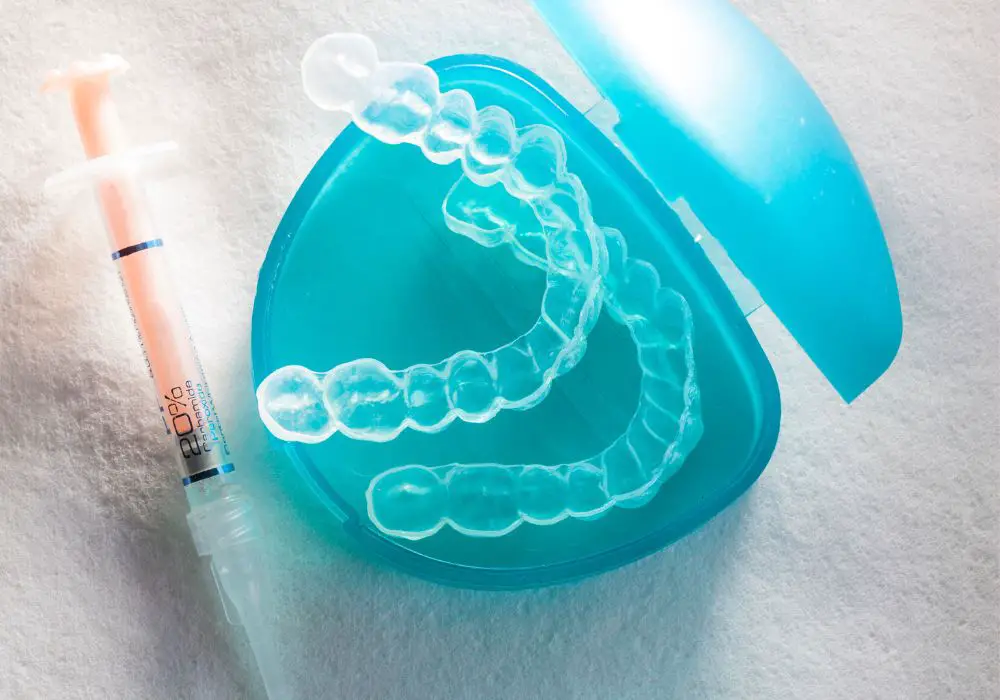
Unfortunately, no over-the-counter whitening method with hydrogen peroxide will provide permanent results. Your teeth will gradually dull and darken again over time after brightening them with peroxide due to:
- Consumption of staining foods and drinks – Coffee, tea, red wine, berries, tomato sauce and other pigmented foods reintroduce staining.
- Tobacco use – Both smoking and chewing tobacco cause severe discoloration.
- Inadequate oral hygiene – Allowing plaque and tartar to build up on teeth leads to yellowing.
- Enamel thinning – Aging and acid erosion causes enamel to wear away, allowing yellow dentin to show through.
- Medications – Certain prescription drugs like tetracycline antibiotics cause intrinsic staining.
- Trauma – Injuries or cracks to teeth alter their light reflection and cause graying.
However, you can prolong the results of hydrogen peroxide whitening by:
- Maintaining excellent oral hygiene through daily brushing, flossing, and professional cleanings every 6 months.
- Avoiding or limiting staining culprits like coffee, tea, tobacco and red wine.
- Doing periodic touch-up whitening treatments or using maintenance whitening toothpastes.
- Getting professional teeth whitening from your dentist every 1-2 years.
Consistency both in minimizing new stains and doing whitening touch-ups is key to maintaining a bright smile long-term.
Is Repeated Hydrogen Peroxide Whitening Harmful for Teeth?
When used properly in moderation, hydrogen peroxide is generally safe for tooth enamel. But improper overuse can cause the following adverse effects:
- Tooth sensitivity – Frequent exposure to peroxide, especially in high concentrations, can irritate nerves and result in temporary sensitivity to hot and cold.
- Gum irritation – Whitening agents can cause gum inflammation, redness, and tenderness when they come into contact with gums. Always rinse carefully.
- Enamel erosion – Repeated use of highly concentrated hydrogen peroxide can wear away enamel over time. Stick to the recommended 1-2 times per week maximum.
- Rebound staining – Aggressively overusing whitening treatments makes enamel more porous and prone to rapidly restaining.
- Tooth fracture – Hydrogen peroxide can seep into existing microscopic cracks or defective fillings and expand them into larger fractures when used too often.
These adverse effects are unlikely with smart, occasional use of lower concentration hydrogen peroxide home treatments. But if you experience any pain, sensitivity or concerns, stop whitening and see your dentist promptly. Professional guidance is recommended if you notice any issues.
Are There Any Situations Where Hydrogen Peroxide Whitening Is Ill-Advised?
While low concentrations of hydrogen peroxide are generally safe for occasional home whitening, there are some situations where caution is warranted:
- Pregnancy & breastfeeding – Swallowing hydrogen peroxide while whitening could potentially be harmful to mother and baby. Best avoided until no longer pregnant or nursing.
- Children under age 18 – Whitening is not recommended while teeth are still developing their enamel strength and thickness.
- Damaged teeth – Teeth with decay, cracks, chips or existing sensitivity are more prone to pain or fracture. Whitening should be avoided.
- Gum disease – Whitening may worsen inflammation and bleeding in people with gingivitis or periodontal disease.
- Dental restorations – Hydrogen peroxide can seep underneath and dehydrate composite resin fillings or crowns, causing damage.
- Oral cancer – Peroxide use is not advised for oral cancer patients currently undergoing treatment.
Your dentist is the best resource for determining if hydrogen peroxide whitening is right for your specific oral health situation and needs. Be sure to consult them before beginning any whitening regimen if you have existing dental conditions or concerns.
Professional Teeth Whitening vs. Hydrogen Peroxide Whitening at Home
Home whitening methods with hydrogen peroxide can provide mild to moderate brightness improvements for teeth. But professional whitening truly gives the most remarkable results:
| Whitening Method | Hydrogen Peroxide Concentration | Whitening Power | Duration of Results |
|---|---|---|---|
| Hydrogen Peroxide Rinses | 3% | Low | Temporary Days – Weeks |
| Whitening Strips | 5-10% | Low – Moderate | Temporary Weeks – Months |
| Custom Whitening Trays | 10-22% | Moderate | 1-2 Years |
| In-Office Whitening | 25-35% | Very High | 2-3 Years |
Professional whitening treatments done under dental supervision use the highest concentrations of hydrogen peroxide gels paired with specialized tools like laser or blue light to dramatically whiten teeth beyond what can be achieved at home. They offer longer lasting whitening, often for several years.
For those with severely stained or discolored teeth seeking a complete smile transformation, professional whitening is likely the best option and well worth the investment. At-home hydrogen peroxide products are great for maintenance between professional treatments.
Household Ingredients to Avoid for Whitening
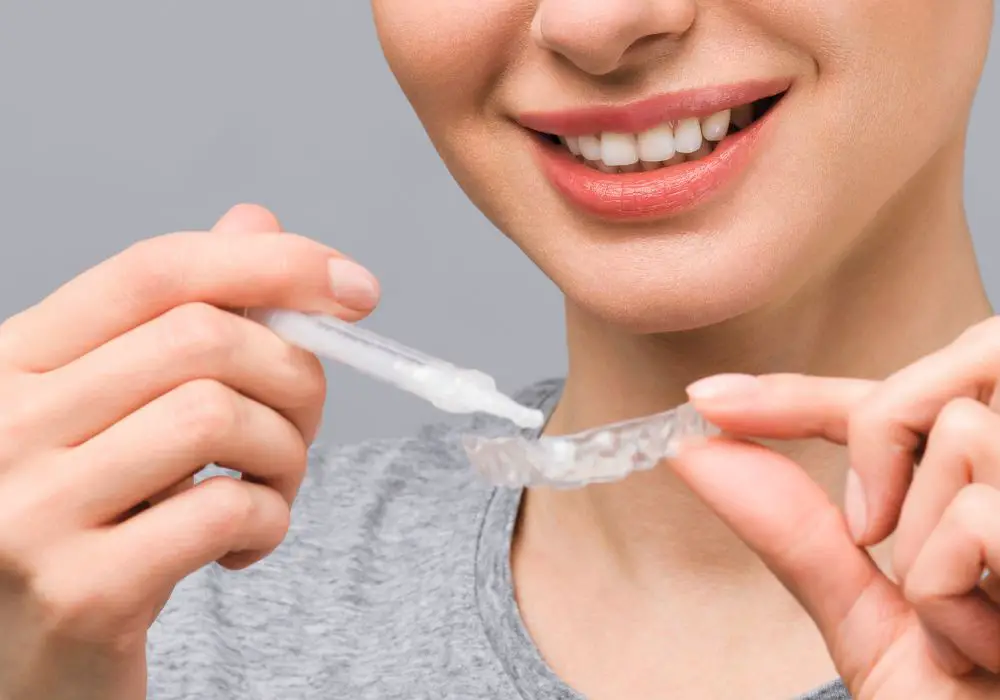
It’s best to stick to known effective whitening methods with hydrogen peroxide, rather than experimenting with household ingredients. Here are some DIY whitening approaches you should avoid:
- Lemon or Lime Juice – Very acidic which erodes and damages tooth enamel over time.
- Vinegar – Also highly acidic, leading to loss of enamel.
- Uncontrolled Baking Soda Use – Too abrasive on enamel, best used sparingly with hydrogen peroxide for gentle lift of surface stains.
- Activated Charcoal – Very abrasive on enamel and can fracture teeth. Also leads to grayish discoloration.
- Coconut Oil – No bleaching properties, just temporarily coats teeth giving a brief whitish appearance. Causes build up.
- Unverified YouTube Hacks – Avoid following advice for homemade whitening pastes with questionable ingredients that may be damaging.
Your best bet is to stick to the proven whitening power of hydrogen peroxide. And consult your dentist about any whitening methods you are unsure about, especially those involving acids or abrasives that erode enamel. Protecting your teeth should be the priority.
Conclusion
Hydrogen peroxide can be an affordable, accessible option for brightening your smile a couple shades when used properly at home. Opt for lower 3% concentrations, limit to 1-2 times per week, rinse thoroughly, and discontinue use if any sensitivity or gum irritation occurs. While not a cure-all for severely discolored teeth, hydrogen peroxide is a reasonable maintenance approach between professional whitening treatments to keep your smile sparkling. Just be sure to consult your dentist if you have any specific oral health concerns. With judicious use, hydrogen peroxide can be a satisfactory and safe DIY whitening technique.
Frequently Asked Questions
1. How long do the whitening results from hydrogen peroxide last?
At-home hydrogen peroxide whitening results can last anywhere from a couple days to a few months before gradually fading, depending on frequency of use. For long-term whitening, professional in-office treatments or custom whitening trays are required.
2. Does hydrogen peroxide really damage enamel with repeated use?
In proper low concentrations and frequencies, hydrogen peroxide will not harm enamel. But overuse of highly concentrated peroxide can lead to enamel erosion over time. Limit home use to 3% solutions just 1-2 times per week.
3. Can hydrogen peroxide effectively whiten dental crowns or veneers?
Unfortunately no, hydrogen peroxide does not change the intrinsic color of dental crowns or veneers. It only bleaches natural tooth structure. These restorations would need to be replaced by your dentist to alter their appearance.
4. Is hydrogen peroxide or baking soda better for whitening teeth?
Hydrogen peroxide is more effective and less abrasive than baking soda for whitening. But combining baking soda with hydrogen peroxide can help provide gentle surface stain removal. Limit baking soda use to avoid damaging enamel.
5. Does hydrogen peroxide have any benefits besides whitening teeth?
Yes, hydrogen peroxide is also antimicrobial so it helps kill bacteria in the mouth that cause plaque, gingivitis, and bad breath while you are whitening. Just be sure to rinse thoroughly afterwards.

